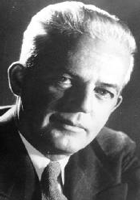William Alexander Percy
William Alexander Percy Poems
I heard a bird at break of day
Sing from the autumn trees
A song so mystical and calm,
So full of certainties,
...
Could I pluck down Aldebaran
And haze the Pleiads in your hair
I could not add more burning to your beauty
Or lend a starrier coldness to your air.
...
My only love is a sailor lad
Whose home is the fickle sea,
To other girls he gives his smiles,
But his mouth he gives to me.
...
William Alexander Percy Biography
William Alexander Percy (May 14, 1885 – January 21, 1942), was a lawyer, planter, and poet from Greenville, Mississippi. His autobiography Lanterns on the Levee (Knopf 1941) became a bestseller. His father LeRoy Percy was the last United States Senator from Mississippi elected by the legislature. And in that largely Protestant state, William championed the Roman Catholicism of his French mother. Percy attended the Episcopal University of the South in Sewanee, Tennessee, a postbellum tradition in his family, spent a year in Paris and then earned a law degree from Harvard and practiced law in his father's firm in Greenville. Percy joined the Commission for Relief in Belgium in November 1916 and served in Belgium as a delegate until the withdrawal of American personnel upon the U.S. declaration of war in April 1917. He served in the US Army in World War I, earning the rank of Captain and the Croix de Guerre. From 1925 to 1932 he edited the Yale Young Poets series, the first of its kind in the country. He also published four volumes of poetry himself with the Yale University Press. A Southern man of letters, Percy befriended many fellow writers, Southern, Northern and European, including William Faulkner. He socialized with Langston Hughes and other people in and about the Harlem Renaissance. Will was a sort of godfather to the Fugitives, or Southern Agrarians, as John Crowe Ransom, Allen Tate and Robert Penn Warren were often called, at Vanderbilt. Percy's family was plagued with suicides, including his first cousin LeRoy Pratt Percy. William adopted his cousin's children, Walker Percy and two siblings, LeRoy and Phin after their parents' death. LeRoy went on to marry Sarah Farish, the exquisite daughter of Will Percy's law partner, Hazelwood Farish and took charge of the Percy family plantation, Trail Lake. Phin married and moved to New Orleans to practice law. Percy's most well known work is his memoir, Lanterns on the Levee: Recollections of a Planter's Son (Alfred A. Knopf, New York 1941). His other works include the text of "They Cast Their Nets in Galilee," which is included in the Episcopal Hymnal 1982 (Hymn 661), and the Collected Poems (Knopf 1943). One piece by Percy is included under the name A.W. Percy in Men and Boys, an anonymous anthology of Uranian poetry (New York, 1934). A friend of Herbert Hoover from the Belgium Relief Effort during the early years of World War I, he was put in charge of relief during the great flood of 1927, when an area larger than all New England (minus Maine) was inundated. During the flood, thousands of blacks fleeing inundated farms and plantations sought refuge on the levee in Greenville. Percy believed that they needed to be evacuated to Vicksburg, Mississippi and ships were prepared to remove them. However, local planters, including Percy's own father, opposed this decision, believing that if the blacks were removed from the area, they would never return. Percy capitulated and the ships left Greenville empty. Thereafter, conditions on the levee deteriorated and Percy received his share of negative press. He later resigned his post and left for a trip to Japan the following day. Percy never married, and it was widely assumed by many of his contemporaries, though hardly ever mentioned, that he was gay. William Armstrong Percy wrote extensively about his cousin's sexuality. The William Alexander Percy Library in Greenville, Mississippi is named for him.)
The Best Poem Of William Alexander Percy
Overtones
I heard a bird at break of day
Sing from the autumn trees
A song so mystical and calm,
So full of certainties,
No man, I think, could listen long
Except upon his knees.
Yet this was but a simple bird,
Alone, among dead trees.
